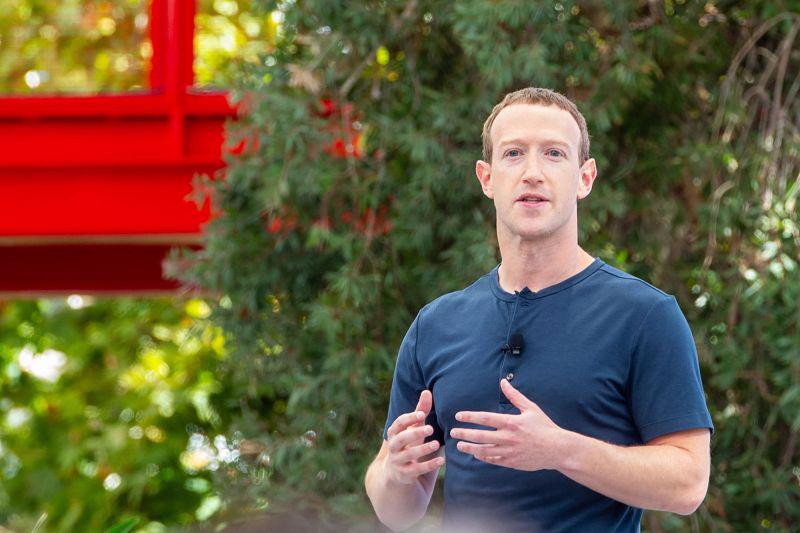
When Mark Zuckerberg founded Facebook in 2004, the platform was designed with a clear purpose in mind: to connect people. The original vision was simple, offering users the ability to stay in touch with friends and family, share updates, and discover what others were up to.
At the time, Facebook was an innovative tool that revolutionized how people interacted online, and it quickly became a go-to platform for social connections.
For many early users, Facebook was an essential part of their social lives. One user, who created an account in 2007 at the age of 12, recalls how Facebook helped them stay connected with friends and family.
It was a way to share life updates and remain in touch with people they cared about. However, over time, as the platform grew, its original purpose began to change, and Facebook started to evolve into something much larger, driven by profit rather than connection.

As Facebook's user base skyrocketed, Zuckerberg and the company’s leadership team expanded the platform's scope, gradually shifting from a tool for personal connection to a digital marketplace.
By the mid-2010s, Facebook was no longer just about connecting friends—it had transformed into a platform for advertising, media, and content consumption. The focus on ads and media content grew increasingly prominent, and users began to see more and more sponsored posts, irrelevant ads, and commercial promotions cluttering their feeds.
This shift away from the platform’s original purpose has been particularly noticeable over the past decade. For the user who initially joined Facebook to stay connected, the change was jarring. The feed, once filled with posts from friends and family, was now dominated by paid advertisements and AI-generated content.
The experience was no longer about building personal connections; it became about maximizing user engagement and monetizing every second of attention.
In recent years, Facebook’s focus on revenue generation has only intensified. This is particularly evident in Zuckerberg’s push for the Metaverse, a digital universe that aims to provide immersive experiences through augmented reality (AR) and virtual reality (VR).
The Metaverse has become Zuckerberg’s true passion, and Facebook, or rather Meta, is now seen as a stepping stone for funding this ambitious vision. The platform that once focused on connecting people has now become a vehicle for promoting Meta’s larger, profit-driven goals.
One of the most recent developments in this shift is Zuckerberg’s announcement that Meta will be removing fact-checkers from the platform. This move has sparked mixed reactions from Facebook users.

While some feel indifferent to the change, others express concern over the implications of eliminating fact-checking on a platform that continues to be a major source of information for millions of people worldwide.
For many, the move is a reflection of Facebook’s shift away from fostering meaningful conversations and providing accurate information. Facebook, originally designed to help people stay connected with friends and family, has increasingly become a platform focused on generating profits.
The removal of fact-checkers raises questions about Meta’s commitment to maintaining the integrity of the platform and its responsibility to provide users with accurate and trustworthy information.
As Zuckerberg shifts his focus to the Metaverse, the original mission of Facebook becomes more difficult to recognize. The platform, once a simple tool for social interaction, is now a sprawling digital ecosystem filled with ads, irrelevant content, and AI-generated distractions.
Many long-time users have abandoned Facebook, frustrated with its shift toward profit-driven motives and the growing prominence of commercial content.
Zuckerberg’s vision for the Metaverse signals a dramatic departure from the platform’s original purpose. While Facebook was once a place for people to connect with friends and share personal moments, it has become a tool for Meta to achieve its larger business goals.

The platform that helped people stay in touch with loved ones has now been reduced to a marketplace designed to extract and monetize users’ attention.
The removal of fact-checkers only adds to the growing concerns about the platform’s direction. While Facebook was never intended to be a reliable news source, many users relied on it for staying informed and engaging with the world.
The move to remove fact-checking further undermines Facebook’s credibility and raises questions about its role in promoting accurate information.
Zuckerberg’s increasing focus on the Metaverse, combined with the decline of Facebook as a platform for meaningful social interaction, has left many users feeling alienated.
The platform that once fostered real connections now seems to prioritize profits and the development of Meta’s vision for the future. As Facebook continues to evolve, it is clear that the platform is no longer about connecting people—it’s about creating a profitable ecosystem for Meta’s larger ambitions.
Looking ahead, it’s uncertain whether Zuckerberg’s vision for the Metaverse will succeed in the same way that Facebook did in its early days. However, it’s clear that Facebook’s best days are behind it.

The platform that once connected millions of people is now a shadow of its former self, driven by business interests rather than the desire to foster genuine relationships.
In conclusion, the decline of Facebook reflects a broader trend in the tech industry, where platforms that were originally designed to connect people are now being repurposed to serve corporate interests.
Zuckerberg’s decision to remove fact-checkers, combined with his focus on the Metaverse, signals a shift away from the platform’s original mission. For many users, the change has been difficult to accept, as Facebook has become a platform that no longer serves their needs for meaningful connection.
The future of Facebook is uncertain, but it’s clear that the platform has strayed far from its roots. Whether Zuckerberg’s Metaverse will fulfill its promise remains to be seen, but one thing is certain: Facebook as we knew it is gone, and it’s unlikely to return to its original purpose of connecting people.
For many, the decline of Facebook is a sad reminder of how quickly a platform can lose its way when profit and corporate ambitions take precedence over user experience and connection.

Ultimately, Facebook’s decline is a reminder of how easily a platform can lose its way when its focus shifts too far from its users and too much toward business interests. Zuckerberg’s vision for the Metaverse may be the future, but it’s unclear if that future will be able to retain the sense of connection that Facebook once offered.
As more users abandon the platform in favor of new social media alternatives, Meta must reevaluate its priorities and figure out how to balance innovation with the needs of its community.
In the end, Facebook’s transformation from a simple social network to a business-driven platform should serve as a cautionary tale for other tech companies. If Zuckerberg’s Metaverse vision is to succeed, it will need to prioritize connection over profit and ensure that users feel valued and respected in the digital spaces they inhabit.
Whether or not Zuckerberg can achieve this balance remains to be seen, but if Facebook’s decline is any indication, the future of social media may be in for a major shift.
As the digital landscape continues to evolve, it’s clear that social media platforms must adapt to the changing needs of their users. Facebook’s decline serves as a warning that tech companies should never lose sight of their core purpose—to connect people.
The rise of the Metaverse and the growing influence of AI-driven platforms may change the way we interact online, but the need for authentic connection will always remain at the heart of social media.


-1743501388-q80.webp)
-1742616283-q80.webp)